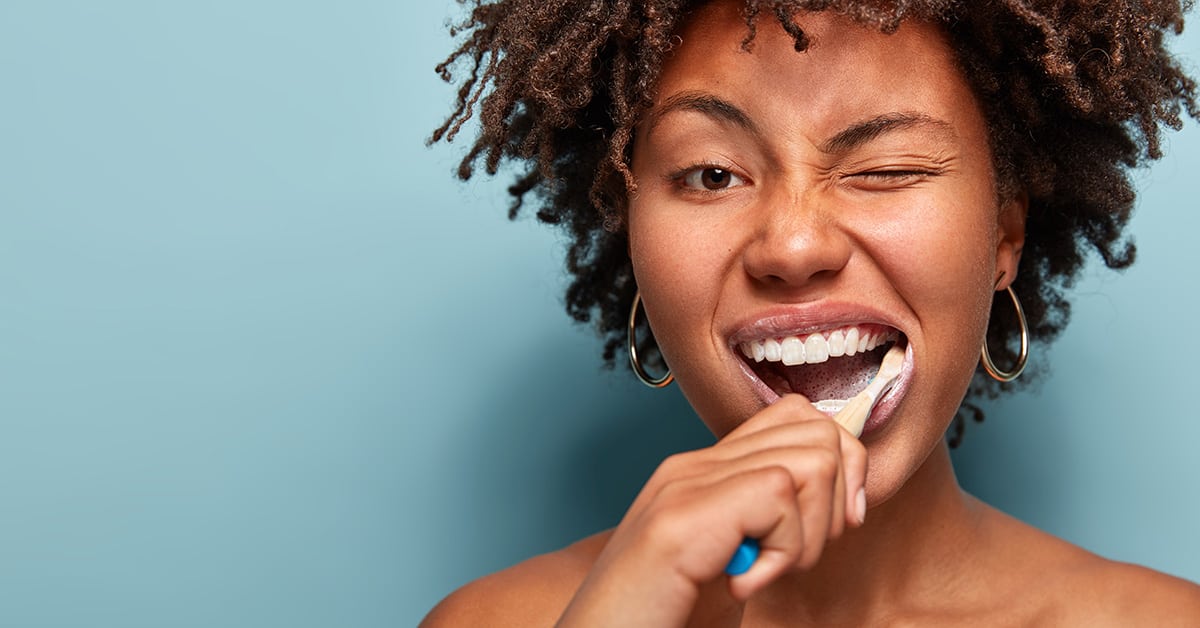It is one of the most common questions dentists and dental hygienists get asked. How long should you really brush your teeth for and does it really matter the length of time. The short answer is 2 minutes, and yes, it matters how long you brush for. One of the most common reasons for tooth decay is poor brushing habits and the buildup of plaque. Proper brushing technique and brushing for the correct amount of time will significantly reduce your chances of developing tooth decay and other long-term dental problems like gum disease and tooth loss.
How long should I brush for?
The American Dental Association (ADA) recommends people brush 2 minutes each time you brush your teeth. You should try to aim for brushing 30 second per quadrant to effectively remove any plaque and food debris left behind.
The average American brushes for less than two minutes, which is why dental caries is considered a prevalent, chronic illness. In fact, studies show people only brush for an average of 45 seconds! What is the reason for 2 minutes and not longer like 4 or 5 minutes?
Research shows that longer brushing times may or may not really be linked to better oral health, but less than two minutes does not provide enough time to remove sticky biofilms that attach to teeth. Brushing for less than two minutes means you likely are more at risk for:
- Tooth decay
- Gum disease
- Bad breath
- Yellow or darkened teeth
- Recurrent tooth decay around fillings
- Tooth and bone loss
When people have orthodontics or fillings and other types of dental appliances, it is even more important to brush for a full two minutes to avoid plaque being left behind. Dental appliances make it more difficult to reach difficult areas in the mouth, so sometimes spending a bit more time will help reduce your chances of plaque build-up.
How can I keep track of how long it takes to brush my teeth?
If you choose to use a manual toothbrush, you can simply look at your smartphone or set a timer for two minutes to ensure proper brushing time.
Many electric toothbrushes feature a built-in timer to help people keep track of their brushing records. Some brushes even have a bluetooth feature and connect to your smartphone to give you updates on your brushing times and where you need to improve.
For people who need a bit of assistance with brushing and guaranteeing they’re spending enough time with the toothbrush, dentists recommend using an electric toothbrush that will have a sensor, light, or timer to tell you when it is time to switch quadrants.
What is the proper brushing technique?
The goal of brushing our teeth is to remove as much plaque and food to maintain our oral health. This means that we want to spend time brushing in difficult to reach areas because it is more likely to develop tooth decay or have gum problems like gingivitis or periodontal disease.
The best way to brush is to brush using an ADA approved soft-bristle toothbrush and fluoride toothpaste. Using an abrasive toothbrush or toothpaste can actually cause damage to our teeth and gums like sensitivity or erosion of enamel.
Brushing techniques differ per person, but one technique that dentists recommend is to use a modified “Bass” brushing technique. This serves to clean near or under the gum first, because this is the primary area that collects plaque and causes inflammation and bleeding.
If you use a manual toothbrush you want to gently brush to avoid damage to your gums and teeth. An electric toothbrush may have a sensor indicating if you’re using too much force.
Other adjunct tools you can use to keep your mouth clean are floss, mouthrinses, a tongue scraper, and an oral irrigator. Using one or more of these dental tools is a great way to keep your mouth feeling fresh, but consult your dentist which is most appropriate for you.
When should I brush my teeth?
The ADA recommends brushing your teeth twice a day for two minutes each time you brush. It is typically recommended to brush after a meal, meaning you should brush after breakfast and after dinner. Many people brush when they first wake up in the morning, but if you think about the habit, you brush your teeth and then eat breakfast, leaving your teeth clean for actually very little time.
Is it possible you can brush for too long?
Brushing your teeth two or three times a day is not damaging, in fact it only keeps your mouth feeling fresh and reduces the amount of food left on your teeth that is used as fuel by bacteria to create decay. But, if you do eat a meal and like to brush afterwards, try and remember to wait about an hour. If you brush too soon after eating, the acidity of foods can cause a weakening of enamel.
Also, remember to brush gently and not use extreme force or a hard-bristle toothbrush. Using abrasive brushes or paste can wear down your enamel and gums leaving you with sensitivity and other dental problems.
To sum up:
Dentists have a funny saying: “You don’t have to brush all your teeth, just the ones you want to keep.” Obviously you want to keep all of your pearly whites as healthy and bright as possible, which means you want to spend the recommended time of two minutes brushing each time. If you think you’re not brushing for the correct amount of time, do yourself a favor and buy a simple timer or electric brush with a built-in timer to guarantee you’re doing the best job in keeping up with your oral health.

